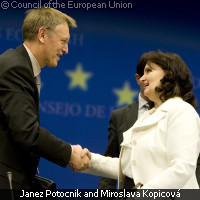EU ministers adopt legal framework for European research infrastructures
European research ministers have agreed on a legal framework for the establishment of European research infrastructures. The decision paves the way for the creation of world class infrastructures that should help Europe to take the lead in a wide range of research fields. The agreement was one of several reached at the latest Competitiveness Council meeting which took place in Brussels, Belgium, on 28 and 29 May. Currently, national and EU laws do not meet the needs of complex research infrastructures with partners in many countries. To remedy this situation, the European Commission put forward a proposal for a new legal framework for European research infrastructures back in July 2008. By December, discussions among the Member States had reached a stalemate over the thorny issue of how to exempt research infrastructures from VAT (Value Added Tax) and excise duty. The Czech Presidency suggested that European research infrastructures be treated as international organisations for VAT purposes. This proposal was accepted by a qualified majority. Under the new legal framework, Member States wishing to host a European research infrastructure will have to declare in their application to the Commission that they recognise the new infrastructure as an international organisation. 'The legal framework will significantly cut financial and administrative costs and clarify the legal environment for the functioning of European research infrastructures and at the same time enhance scientific cooperation,' stated the Czech Minister of Education, Youth and Sports, Miroslava Kopicová. 'In this way it will bring down barriers to investments in science and research. This achievement is considered a valuable success not only by me but also by my European counterparts.' EU Commissioner for Science and Research Janez Potocnik welcomed the decision, saying: 'The Council's agreement is excellent news for EU research and for the EU economy. Investing today in the construction of large-scale research infrastructures can certainly contribute to the EU economic recovery and will surely reinforce our competitiveness when we get out of the recession. It will help to create jobs, economic activities, and help produce the cutting-edge scientific knowledge which will be the new engine for the EU's growth and competitiveness.' The ministers also highlighted the important role research infrastructures can play in boosting regional development. In a statement, they invite Member States and the Commission to 'encourage the development of research infrastructures, including the distribution, in a way to facilitate balanced implementation of ERA [European Research Area], while preserving the principle of scientific excellence and ensuring effective access.' They also stress the importance of analysing the socio-economic returns and cost effectiveness for the host region as well as for Europe as a whole. Other items on the agenda included the evaluation and impact assessment of European research framework programmes (FPs) and the realisation of the ERA. On the first point, ministers invited the Commission to 'clearly and explicitly acknowledge, when designing new FPs, the extent to which this work is based on evaluation results, foresight studies and impact assessments'. Finally, on the development of the ERA, ministers encourage Member States and the Commission to 'further engage in ensuring enhanced complementarity and synergies between Community policies and instruments as well as between regional, national and intergovernmental initiatives.' 'Today, the Czech Presidency managed to meet several important priorities and fulfil the motto of a 'European Research Area without barriers',' concluded Minister Kopicová.
Countries
Czechia



